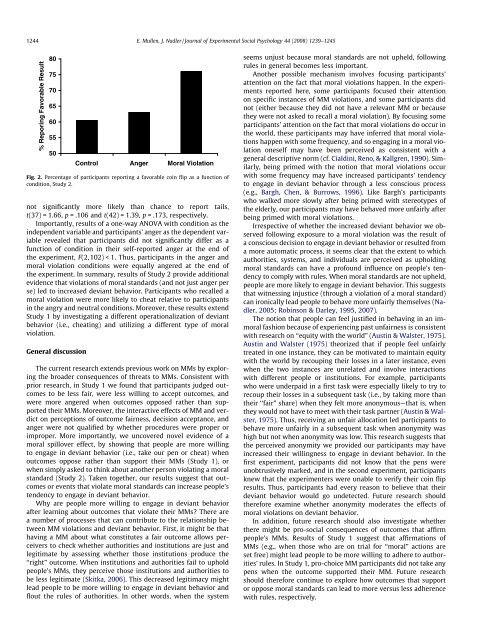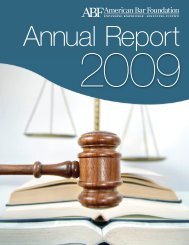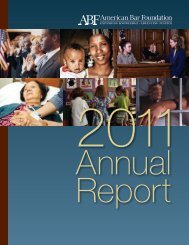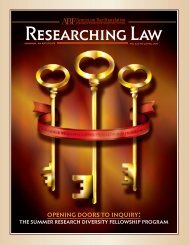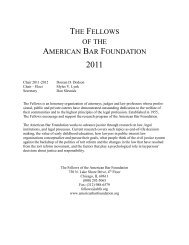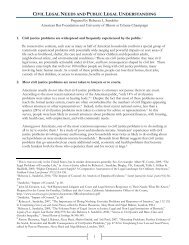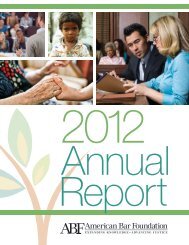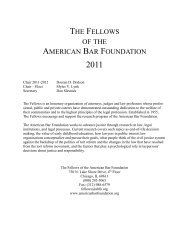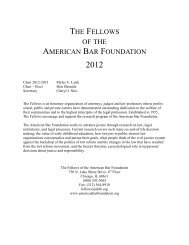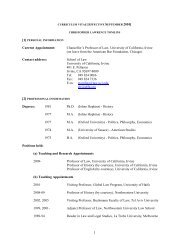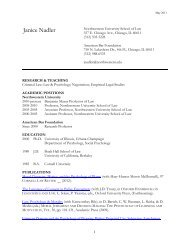1244 E. Mullen, J. Nadler / Journal <str<strong>on</strong>g>of</str<strong>on</strong>g> Experimental Social Psychology 44 (2008) 1239–1245% Reporing Favorable Result80757065605550not significantly more likely than chance to report tails,t(37) = 1.66, p = .106 and t(42) = 1.39, p = .173, respectively.Importantly, results <str<strong>on</strong>g>of</str<strong>on</strong>g> a <strong>on</strong>e-way ANOVA with c<strong>on</strong>diti<strong>on</strong> as theindependent variable and participants’ anger as the dependent variablerevealed that participants did not significantly differ as afuncti<strong>on</strong> <str<strong>on</strong>g>of</str<strong>on</strong>g> c<strong>on</strong>diti<strong>on</strong> in their self-reported anger at the end <str<strong>on</strong>g>of</str<strong>on</strong>g>the experiment, F(2,102) < 1. Thus, participants in the anger and<str<strong>on</strong>g>moral</str<strong>on</strong>g> violati<strong>on</strong> c<strong>on</strong>diti<strong>on</strong>s were equally angered at the end <str<strong>on</strong>g>of</str<strong>on</strong>g>the experiment. In summary, results <str<strong>on</strong>g>of</str<strong>on</strong>g> Study 2 provide additi<strong>on</strong>alevidence that <str<strong>on</strong>g>violati<strong>on</strong>s</str<strong>on</strong>g> <str<strong>on</strong>g>of</str<strong>on</strong>g> <str<strong>on</strong>g>moral</str<strong>on</strong>g> standards (and not just anger perse) led to increased <strong>deviant</strong> <strong>behavior</strong>. Participants who recalled a<str<strong>on</strong>g>moral</str<strong>on</strong>g> violati<strong>on</strong> were more likely to cheat relative to participantsin the angry and neutral c<strong>on</strong>diti<strong>on</strong>s. Moreover, these results extendStudy 1 by investigating a different operati<strong>on</strong>alizati<strong>on</strong> <str<strong>on</strong>g>of</str<strong>on</strong>g> <strong>deviant</strong><strong>behavior</strong> (i.e., cheating) and utilizing a different type <str<strong>on</strong>g>of</str<strong>on</strong>g> <str<strong>on</strong>g>moral</str<strong>on</strong>g>violati<strong>on</strong>.General discussi<strong>on</strong>C<strong>on</strong>trol Anger <str<strong>on</strong>g>Moral</str<strong>on</strong>g> Violati<strong>on</strong>Fig. 2. Percentage <str<strong>on</strong>g>of</str<strong>on</strong>g> participants reporting a favorable coin flip as a functi<strong>on</strong> <str<strong>on</strong>g>of</str<strong>on</strong>g>c<strong>on</strong>diti<strong>on</strong>, Study 2.<str<strong>on</strong>g>The</str<strong>on</strong>g> current research extends previous work <strong>on</strong> MMs by exploringthe broader c<strong>on</strong>sequences <str<strong>on</strong>g>of</str<strong>on</strong>g> threats to MMs. C<strong>on</strong>sistent withprior research, in Study 1 we found that participants judged outcomesto be less fair, were less willing to accept outcomes, andwere more angered when outcomes opposed rather than supportedtheir MMs. Moreover, the interactive <str<strong>on</strong>g>effect</str<strong>on</strong>g>s <str<strong>on</strong>g>of</str<strong>on</strong>g> MM and verdict<strong>on</strong> percepti<strong>on</strong>s <str<strong>on</strong>g>of</str<strong>on</strong>g> outcome fairness, decisi<strong>on</strong> acceptance, andanger were not qualified by whether procedures were proper orimproper. More importantly, we uncovered novel evidence <str<strong>on</strong>g>of</str<strong>on</strong>g> a<str<strong>on</strong>g>moral</str<strong>on</strong>g> spillover <str<strong>on</strong>g>effect</str<strong>on</strong>g>, by showing that people are more willingto engage in <strong>deviant</strong> <strong>behavior</strong> (i.e., take our pen or cheat) whenoutcomes oppose rather than support their MMs (Study 1), orwhen simply asked to think about another pers<strong>on</strong> violating a <str<strong>on</strong>g>moral</str<strong>on</strong>g>standard (Study 2). Taken together, our results suggest that outcomesor events that violate <str<strong>on</strong>g>moral</str<strong>on</strong>g> standards can increase people’stendency to engage in <strong>deviant</strong> <strong>behavior</strong>.Why are people more willing to engage in <strong>deviant</strong> <strong>behavior</strong>after learning about outcomes that violate their MMs? <str<strong>on</strong>g>The</str<strong>on</strong>g>re area number <str<strong>on</strong>g>of</str<strong>on</strong>g> processes that can c<strong>on</strong>tribute to the relati<strong>on</strong>ship betweenMM <str<strong>on</strong>g>violati<strong>on</strong>s</str<strong>on</strong>g> and <strong>deviant</strong> <strong>behavior</strong>. First, it might be thathaving a MM about what c<strong>on</strong>stitutes a fair outcome allows perceiversto check whether authorities and instituti<strong>on</strong>s are just andlegitimate by assessing whether those instituti<strong>on</strong>s produce the‘‘right” outcome. When instituti<strong>on</strong>s and authorities fail to upholdpeople’s MMs, they perceive those instituti<strong>on</strong>s and authorities tobe less legitimate (Skitka, 2006). This decreased legitimacy mightlead people to be more willing to engage in <strong>deviant</strong> <strong>behavior</strong> andflout the rules <str<strong>on</strong>g>of</str<strong>on</strong>g> authorities. In other words, when the systemseems unjust because <str<strong>on</strong>g>moral</str<strong>on</strong>g> standards are not upheld, followingrules in general becomes less important.Another possible mechanism involves focusing participants’attenti<strong>on</strong> <strong>on</strong> the fact that <str<strong>on</strong>g>moral</str<strong>on</strong>g> <str<strong>on</strong>g>violati<strong>on</strong>s</str<strong>on</strong>g> happen. In the experimentsreported here, some participants focused their attenti<strong>on</strong><strong>on</strong> specific instances <str<strong>on</strong>g>of</str<strong>on</strong>g> MM <str<strong>on</strong>g>violati<strong>on</strong>s</str<strong>on</strong>g>, and some participants didnot (either because they did not have a relevant MM or becausethey were not asked to recall a <str<strong>on</strong>g>moral</str<strong>on</strong>g> violati<strong>on</strong>). By focusing someparticipants’ attenti<strong>on</strong> <strong>on</strong> the fact that <str<strong>on</strong>g>moral</str<strong>on</strong>g> <str<strong>on</strong>g>violati<strong>on</strong>s</str<strong>on</strong>g> do occur inthe world, these participants may have inferred that <str<strong>on</strong>g>moral</str<strong>on</strong>g> <str<strong>on</strong>g>violati<strong>on</strong>s</str<strong>on</strong>g>happen with some frequency, and so engaging in a <str<strong>on</strong>g>moral</str<strong>on</strong>g> violati<strong>on</strong><strong>on</strong>eself may have been perceived as c<strong>on</strong>sistent with ageneral descriptive norm (cf. Cialdini, Reno, & Kallgren, 1990). Similarly,being primed with the noti<strong>on</strong> that <str<strong>on</strong>g>moral</str<strong>on</strong>g> <str<strong>on</strong>g>violati<strong>on</strong>s</str<strong>on</strong>g> occurwith some frequency may have increased participants’ tendencyto engage in <strong>deviant</strong> <strong>behavior</strong> through a less c<strong>on</strong>scious process(e.g., Bargh, Chen, & Burrows, 1996). Like Bargh’s participantswho walked more slowly after being primed with stereotypes <str<strong>on</strong>g>of</str<strong>on</strong>g>the elderly, our participants may have behaved more unfairly afterbeing primed with <str<strong>on</strong>g>moral</str<strong>on</strong>g> <str<strong>on</strong>g>violati<strong>on</strong>s</str<strong>on</strong>g>.Irrespective <str<strong>on</strong>g>of</str<strong>on</strong>g> whether the increased <strong>deviant</strong> <strong>behavior</strong> we observedfollowing exposure to a <str<strong>on</strong>g>moral</str<strong>on</strong>g> violati<strong>on</strong> was the result <str<strong>on</strong>g>of</str<strong>on</strong>g>a c<strong>on</strong>scious decisi<strong>on</strong> to engage in <strong>deviant</strong> <strong>behavior</strong> or resulted froma more automatic process, it seems clear that the extent to whichauthorities, systems, and individuals are perceived as upholding<str<strong>on</strong>g>moral</str<strong>on</strong>g> standards can have a pr<str<strong>on</strong>g>of</str<strong>on</strong>g>ound influence <strong>on</strong> people’s tendencyto comply with rules. When <str<strong>on</strong>g>moral</str<strong>on</strong>g> standards are not upheld,people are more likely to engage in <strong>deviant</strong> <strong>behavior</strong>. This suggeststhat witnessing injustice (through a violati<strong>on</strong> <str<strong>on</strong>g>of</str<strong>on</strong>g> a <str<strong>on</strong>g>moral</str<strong>on</strong>g> standard)can ir<strong>on</strong>ically lead people to behave more unfairly themselves (Nadler,2005; Robins<strong>on</strong> & Darley, 1995, 2007).<str<strong>on</strong>g>The</str<strong>on</strong>g> noti<strong>on</strong> that people can feel justified in behaving in an im<str<strong>on</strong>g>moral</str<strong>on</strong>g>fashi<strong>on</strong> because <str<strong>on</strong>g>of</str<strong>on</strong>g> experiencing past unfairness is c<strong>on</strong>sistentwith research <strong>on</strong> ‘‘equity with the world” (Austin & Walster, 1975).Austin and Walster (1975) theorized that if people feel unfairlytreated in <strong>on</strong>e instance, they can be motivated to maintain equitywith the world by recouping their losses in a later instance, evenwhen the two instances are unrelated and involve interacti<strong>on</strong>swith different people or instituti<strong>on</strong>s. For example, participantswho were underpaid in a first task were especially likely to try torecoup their losses in a subsequent task (i.e., by taking more thantheir ‘‘fair” share) when they felt more an<strong>on</strong>ymous—that is, whenthey would not have to meet with their task partner (Austin & Walster,1975). Thus, receiving an unfair allocati<strong>on</strong> led participants tobehave more unfairly in a subsequent task when an<strong>on</strong>ymity washigh but not when an<strong>on</strong>ymity was low. This research suggests thatthe perceived an<strong>on</strong>ymity we provided our participants may haveincreased their willingness to engage in <strong>deviant</strong> <strong>behavior</strong>. In thefirst experiment, participants did not know that the pens wereunobtrusively marked, and in the sec<strong>on</strong>d experiment, participantsknew that the experimenters were unable to verify their coin flipresults. Thus, participants had every reas<strong>on</strong> to believe that their<strong>deviant</strong> <strong>behavior</strong> would go undetected. Future research shouldtherefore examine whether an<strong>on</strong>ymity moderates the <str<strong>on</strong>g>effect</str<strong>on</strong>g>s <str<strong>on</strong>g>of</str<strong>on</strong>g><str<strong>on</strong>g>moral</str<strong>on</strong>g> <str<strong>on</strong>g>violati<strong>on</strong>s</str<strong>on</strong>g> <strong>on</strong> <strong>deviant</strong> <strong>behavior</strong>.In additi<strong>on</strong>, future research should also investigate whetherthere might be pro-social c<strong>on</strong>sequences <str<strong>on</strong>g>of</str<strong>on</strong>g> outcomes that affirmpeople’s MMs. Results <str<strong>on</strong>g>of</str<strong>on</strong>g> Study 1 suggest that affirmati<strong>on</strong>s <str<strong>on</strong>g>of</str<strong>on</strong>g>MMs (e.g., when those who are <strong>on</strong> trial for ‘‘<str<strong>on</strong>g>moral</str<strong>on</strong>g>” acti<strong>on</strong>s areset free) might lead people to be more willing to adhere to authorities’rules. In Study 1, pro-choice MM participants did not take anypens when the outcome supported their MM. Future researchshould therefore c<strong>on</strong>tinue to explore how outcomes that supportor oppose <str<strong>on</strong>g>moral</str<strong>on</strong>g> standards can lead to more versus less adherencewith rules, respectively.
E. Mullen, J. Nadler / Journal <str<strong>on</strong>g>of</str<strong>on</strong>g> Experimental Social Psychology 44 (2008) 1239–1245 1245In additi<strong>on</strong>, future research should test the <str<strong>on</strong>g>moral</str<strong>on</strong>g> spilloverhypothesis with a more representative sample <str<strong>on</strong>g>of</str<strong>on</strong>g> the populati<strong>on</strong>.Because we could not recruit enough pro-life MM participantsin Study 1, <strong>on</strong>e might worry that our results are limited toexplaining the resp<strong>on</strong>ses <str<strong>on</strong>g>of</str<strong>on</strong>g> pro-choice MM participants. However,other research has found no statistical differences in thefairness judgments <str<strong>on</strong>g>of</str<strong>on</strong>g> pro-life and pro-choice participants followinga violati<strong>on</strong> <str<strong>on</strong>g>of</str<strong>on</strong>g> a MM (Mullen & Skitka, 2006), and hasfound evidence for the MM <str<strong>on</strong>g>effect</str<strong>on</strong>g> using representative samples<str<strong>on</strong>g>of</str<strong>on</strong>g> Americans across a variety <str<strong>on</strong>g>of</str<strong>on</strong>g> topical domains (Skitka, 2002;Skitka, 2006). In additi<strong>on</strong>, in Study 2 we found evidence <str<strong>on</strong>g>of</str<strong>on</strong>g> increased<strong>deviant</strong> <strong>behavior</strong> following a <str<strong>on</strong>g>moral</str<strong>on</strong>g> violati<strong>on</strong> using adultparticipants that represented a broader sample <str<strong>on</strong>g>of</str<strong>on</strong>g> the populati<strong>on</strong>(i.e., participants had a broader range <str<strong>on</strong>g>of</str<strong>on</strong>g> educati<strong>on</strong>al backgroundsand age relative to the liberal college students usedin Study 1). Thus, it seems reas<strong>on</strong>able to c<strong>on</strong>clude that our <str<strong>on</strong>g>moral</str<strong>on</strong>g>spillover results generalize bey<strong>on</strong>d pro-choice MM participantsand are not simply a tendency displayed by liberalcollege students, but future research should nevertheless dem<strong>on</strong>stratethis empirically.In c<strong>on</strong>clusi<strong>on</strong>, we observed very different patterns <str<strong>on</strong>g>of</str<strong>on</strong>g> <strong>behavior</strong>depending <strong>on</strong> whether <str<strong>on</strong>g>moral</str<strong>on</strong>g> c<strong>on</strong>victi<strong>on</strong>s were implicated. Acrossboth studies, exposure to <str<strong>on</strong>g>moral</str<strong>on</strong>g>ly threatening outcomes increasedthe likelihood <str<strong>on</strong>g>of</str<strong>on</strong>g> engaging in <strong>deviant</strong> <strong>behavior</strong>. In additi<strong>on</strong>, in Study1, exposure to <str<strong>on</strong>g>moral</str<strong>on</strong>g>ly affirming outcomes decreased the likelihood<str<strong>on</strong>g>of</str<strong>on</strong>g> engaging in <strong>deviant</strong> <strong>behavior</strong>. At the same time, we observedno significant difference in likelihood <str<strong>on</strong>g>of</str<strong>on</strong>g> <strong>deviant</strong> <strong>behavior</strong>as a functi<strong>on</strong> <str<strong>on</strong>g>of</str<strong>on</strong>g> outcome when the outcome was unrelated to participants’MMs, even when participants perceived the outcome tobe unfair (Study 1) or anger-provoking (Study 2). Moreover, inStudy 1, we observed no significant <str<strong>on</strong>g>effect</str<strong>on</strong>g>s <str<strong>on</strong>g>of</str<strong>on</strong>g> procedural fairness<strong>on</strong> people’s percepti<strong>on</strong>s <str<strong>on</strong>g>of</str<strong>on</strong>g> outcome fairness, decisi<strong>on</strong> acceptance,anger, or <strong>deviant</strong> <strong>behavior</strong>. Although previous research suggeststhat people are more willing to accept unfavorable outcomes andcomply with authorities’ rules when procedures are fair (e.g., Folgeret al., 1979; Tyler, 1990), our results suggest that the fair process<str<strong>on</strong>g>effect</str<strong>on</strong>g> may be weaker when people have a MM relevant to theissue at hand. In c<strong>on</strong>clusi<strong>on</strong>, the extent to which authorities andinstituti<strong>on</strong>s produce <str<strong>on</strong>g>moral</str<strong>on</strong>g>ly tenable outcomes may influence people’stendency to follow the rules. Our results suggest that thereare limits to authorities’ ability to gain citizen cooperati<strong>on</strong> andcompliance with rules when outcomes are inc<strong>on</strong>sistent with people’s<str<strong>on</strong>g>moral</str<strong>on</strong>g> standards.AcknowledgmentsThis research was supported by the Dispute Resoluti<strong>on</strong> ResearchCenter at Northwestern University, the American Bar Foundati<strong>on</strong>,and was facilitated by Nati<strong>on</strong>al Science Foundati<strong>on</strong> GrantSES-0530380. We thank Gillian Fensterman and Jennifer Rosnerfor their help with data collecti<strong>on</strong> and John Patrick Johns<strong>on</strong> forhis help with the logit analyses in Study 1.ReferencesAustin, W., & Walster, E. (1975). Equity with the world: <str<strong>on</strong>g>The</str<strong>on</strong>g> trans-relati<strong>on</strong>al <str<strong>on</strong>g>effect</str<strong>on</strong>g>s<str<strong>on</strong>g>of</str<strong>on</strong>g> equity and inequity. Sociometry, 38, 474–495.Bargh, J. A., Chen, M., & Burrows, L. (1996). Automaticity <str<strong>on</strong>g>of</str<strong>on</strong>g> social <strong>behavior</strong>: Direct<str<strong>on</strong>g>effect</str<strong>on</strong>g>s <str<strong>on</strong>g>of</str<strong>on</strong>g> trait c<strong>on</strong>struct and stereotype activati<strong>on</strong> <strong>on</strong> acti<strong>on</strong>. Journal <str<strong>on</strong>g>of</str<strong>on</strong>g>Pers<strong>on</strong>ality and Social Psychology, 71, 230–244.Bauman, C. W. (2007). Procedural and <str<strong>on</strong>g>moral</str<strong>on</strong>g> influences <strong>on</strong> fairness judgments,decisi<strong>on</strong> acceptance, and organizati<strong>on</strong>al <strong>behavior</strong> (Doctoral Dissertati<strong>on</strong>,University <str<strong>on</strong>g>of</str<strong>on</strong>g> Illinois at Chicago, 2006). Dissertati<strong>on</strong> Abstracts Internati<strong>on</strong>al:Secti<strong>on</strong> B: <str<strong>on</strong>g>The</str<strong>on</strong>g> Sciences and Engineering, 67, 5463.Cann<strong>on</strong>, L. (1999). Official negligence: How Rodney King and the riots changed LosAngeles and the LAPD. Boulder, CO: Westview Press.Cialdini, R. B., Reno, R. R., & Kallgren, C. A. (1990). A focus theory <str<strong>on</strong>g>of</str<strong>on</strong>g> normativec<strong>on</strong>duct: Recycling the c<strong>on</strong>cept <str<strong>on</strong>g>of</str<strong>on</strong>g> norms to reduce littering in public places.Journal <str<strong>on</strong>g>of</str<strong>on</strong>g> Pers<strong>on</strong>ality and Social Psychology, 58, 1015–1026.Demaris, A. (1991). A framework for the interpretati<strong>on</strong> <str<strong>on</strong>g>of</str<strong>on</strong>g> first-order interacti<strong>on</strong> inlogit modeling. Psychological Bulletin, 110, 557–570.Demaris, A. (1992). Logit modeling: Practical applicati<strong>on</strong>s. Newbury Park, CA: Sage.Folger, R., Rosenfeld, D., Grove, J., & Corkran, L. (1979). Effects <str<strong>on</strong>g>of</str<strong>on</strong>g> ‘‘voice” and peeropini<strong>on</strong>s <strong>on</strong> resp<strong>on</strong>ses to inequity. Journal <str<strong>on</strong>g>of</str<strong>on</strong>g> Pers<strong>on</strong>ality and Social Psychology,37, 2253–2261.Friedman, L. (1975). <str<strong>on</strong>g>The</str<strong>on</strong>g> legal system: A social science perspective. NY: Russell SageFoundati<strong>on</strong>.Greenberg, J., & Folger, R. (1983). Procedural justice, participati<strong>on</strong> and the fairprocess <str<strong>on</strong>g>effect</str<strong>on</strong>g> in groups and organizati<strong>on</strong>s. In P. B. Paulus (Ed.), Basic groupprocesses (pp. 235–256). NY: Springer Verlag.Haidt, J., Rosenberg, E., & Hom, H. (2003). Differentiating diversities: <str<strong>on</strong>g>Moral</str<strong>on</strong>g> diversityis not like other kinds. Journal <str<strong>on</strong>g>of</str<strong>on</strong>g> Applied Social Psychology, 33, 1–36.Hare, R. M. (1981). <str<strong>on</strong>g>Moral</str<strong>on</strong>g> thinking. Oxford, England: Oxford University Press.Kant, I. (1947). Fundamentals <str<strong>on</strong>g>of</str<strong>on</strong>g> the metaphysics <str<strong>on</strong>g>of</str<strong>on</strong>g> <str<strong>on</strong>g>moral</str<strong>on</strong>g>s. New York: L<strong>on</strong>gmans[Original work published 1786].Kohlberg, L. (1984). Essays <strong>on</strong> <str<strong>on</strong>g>moral</str<strong>on</strong>g> development: Vol. 2. <str<strong>on</strong>g>The</str<strong>on</strong>g> psychology <str<strong>on</strong>g>of</str<strong>on</strong>g> <str<strong>on</strong>g>moral</str<strong>on</strong>g>development. New York: Harper.Mullen, E., & Skitka, L. J. (2006). Exploring the psychological underpinnings <str<strong>on</strong>g>of</str<strong>on</strong>g> the<str<strong>on</strong>g>moral</str<strong>on</strong>g> mandate <str<strong>on</strong>g>effect</str<strong>on</strong>g>: Motivated reas<strong>on</strong>ing, group differentiati<strong>on</strong>, or anger?Journal <str<strong>on</strong>g>of</str<strong>on</strong>g> Pers<strong>on</strong>ality and Social Psychology, 90, 629–643.Nadler, J. (2005). Flouting the law. Texas Law Review, 83, 1399–1441.Nucci, L. P. (2001). Educati<strong>on</strong> in the <str<strong>on</strong>g>moral</str<strong>on</strong>g> domain. Cambridge: Cambridge UniversityPress.Nucci, L. P., & Turiel, E. (1978). Social interacti<strong>on</strong> and the development <str<strong>on</strong>g>of</str<strong>on</strong>g> socialc<strong>on</strong>cepts in pre-school children. Child Development, 49, 400–407.Petty, R. E., & Krosnick, J. A. (1995). Attitude strength: An overview. In Attitudestrength: Antecedents and c<strong>on</strong>sequences (pp. 1–24). Mahwah, NJ: LawrenceErlbaum.Piaget, J. (1932/1997). <str<strong>on</strong>g>The</str<strong>on</strong>g> <str<strong>on</strong>g>moral</str<strong>on</strong>g> judgment <str<strong>on</strong>g>of</str<strong>on</strong>g> the child. Glencoe, IL: Free Press.Robins<strong>on</strong>, P. H., & Darley, J. M. (1995). <str<strong>on</strong>g>The</str<strong>on</strong>g> utility <str<strong>on</strong>g>of</str<strong>on</strong>g> desert. Northwestern UniversityLaw Review, 91, 453–499.Robins<strong>on</strong>, P. H., & Darley, J. M. (2007). Intuiti<strong>on</strong>s <str<strong>on</strong>g>of</str<strong>on</strong>g> justice: Implicati<strong>on</strong>s for criminallaw and justice policy. Southern California Law Review, 81, 1–67.Shweder, R. (2002). <str<strong>on</strong>g>The</str<strong>on</strong>g> nature <str<strong>on</strong>g>of</str<strong>on</strong>g> <str<strong>on</strong>g>moral</str<strong>on</strong>g>ity: <str<strong>on</strong>g>The</str<strong>on</strong>g> category <str<strong>on</strong>g>of</str<strong>on</strong>g> bad acts. Medical Ethics,9, 6–7.Skitka, L. J. (2002). Do the means justify the ends, or do the ends justify the means?A test <str<strong>on</strong>g>of</str<strong>on</strong>g> the value protecti<strong>on</strong> model <str<strong>on</strong>g>of</str<strong>on</strong>g> justice. Pers<strong>on</strong>ality and Social PsychologyBulletin, 28, 588–597.Skitka, L. J. (2006). Legislating <str<strong>on</strong>g>moral</str<strong>on</strong>g>ity: How deep is the US Supreme Court’s reservoir<str<strong>on</strong>g>of</str<strong>on</strong>g> good will? Paper presented at the meeting <str<strong>on</strong>g>of</str<strong>on</strong>g> the Internati<strong>on</strong>al Society forJustice Research, Berlin, Germany.Skitka, L. J., Bauman, C. W., & Mullen, E. (2004). Political tolerance and coming topsychological closure following the September 11, 2001 terrorist attacks: Anintegrative approach. Pers<strong>on</strong>ality and Social Psychology Bulletin, 30, 743–756.Skitka, L. J., Bauman, C. W., & Mullen, E. (2008). <str<strong>on</strong>g>Moral</str<strong>on</strong>g>ity and justice: An expandedtheoretical perspective and empirical review. In K. A. Hegtvedt & J. Clay-Warner(Eds.), Advances in Group Processes: Justice. San Diego, CA: Elsevier.Skitka, L. J., & Mullen, E. (2002). Understanding judgments <str<strong>on</strong>g>of</str<strong>on</strong>g> fairness in a real-worldpolitical c<strong>on</strong>text: A test <str<strong>on</strong>g>of</str<strong>on</strong>g> the value protecti<strong>on</strong> model <str<strong>on</strong>g>of</str<strong>on</strong>g> justice reas<strong>on</strong>ing.Pers<strong>on</strong>ality and Social Psychology Bulletin, 28, 1419–1429.Smith, M. (1994). <str<strong>on</strong>g>The</str<strong>on</strong>g> <str<strong>on</strong>g>moral</str<strong>on</strong>g> problem. Oxford, England: Blackwell.Tetlock, P. E., Kristel, O. V., Els<strong>on</strong>, S. B., Green, M. C., & Lerner, J. S. (2000). <str<strong>on</strong>g>The</str<strong>on</strong>g>psychology <str<strong>on</strong>g>of</str<strong>on</strong>g> the unthinkable: Taboo trade-<str<strong>on</strong>g>of</str<strong>on</strong>g>fs, forbidden base rates, andheretical counterfactuals. Journal <str<strong>on</strong>g>of</str<strong>on</strong>g> Pers<strong>on</strong>ality and Social Psychology, 78,853–870.Turiel, E. (1983). <str<strong>on</strong>g>The</str<strong>on</strong>g> development <str<strong>on</strong>g>of</str<strong>on</strong>g> social knowledge: <str<strong>on</strong>g>Moral</str<strong>on</strong>g>ity and c<strong>on</strong>venti<strong>on</strong>.Cambridge, England: Cambridge University Press.Tyler, T. R. (1990). Why people obey the law. New Haven, CT: Yale University Press.Van den Bos, K., Lind, E. A., Vermunt, R., & Wilke, H. A. M. (1997). How do I judge myoutcome when I do not know the outcome <str<strong>on</strong>g>of</str<strong>on</strong>g> others? <str<strong>on</strong>g>The</str<strong>on</strong>g> psychology <str<strong>on</strong>g>of</str<strong>on</strong>g> the fairprocess <str<strong>on</strong>g>effect</str<strong>on</strong>g>. Journal <str<strong>on</strong>g>of</str<strong>on</strong>g> Pers<strong>on</strong>ality and Social Psychology, 72, 1034–1046.


